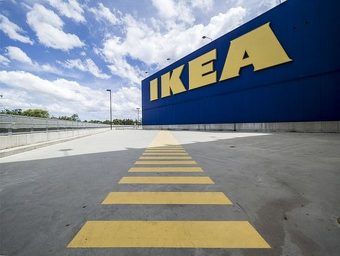
IKEA has revealed further growth in global sales across its sustainable products range last year, as the Swedish furniture giant today reported progress on renewable energy generation as part of its latest sustainability update.
Published today, IKEA’s annual global sustainability report covers the year ending 31 August 2017, and shows that sales of its Sustainable Life at Home range – items which enable customers to save energy, water, waste and money – have grown to €1.7bn.
The range now encompasses more than 500 products, including recycling bins, low energy lightbulbs, efficient kitchen taps and induction hobs which are designed to avoid the air pollution produced by traditional gas cookers.
It also includes its in-store solar panel and battery storage range, which after launching last year is now available in five countries – the UK, Netherlands, Poland, Belgium and Switzerland. The firm said it wanted to become the “first global solar retailer”.
The reportalso confirms the proportion of renewable electricity used by IKEA globally rose from 71 per cent in 2016 to 73 per cent last year, with 750,000 solar panels now installed on IKEA buildings and the firm having invested in 416 wind turbines.
In total, IKEA’s wind and solar sites generated more than 2,300GWh of renewable electricity over the period, the report confirmed, as the company moves closer to its target of generating as much clean energy as it consumes by 2020.
LED lightbulb sales, meanwhile, surged from 79 million bulbs in 2016 to 85 million last year, with IKEA setting its sights on selling 500 million ultra-efficient bulbs between 2015 and 2020.
Scope 1 and 2 emissions from within the retailer’s operations also fell 2.3 per cent, as the company reported slight improvements in energy efficiency across its retail and distribution centre buildings.
However, challenges remain for the company regarding its overall climate impact, with the report showing its scope 3 emissions from across its value chain – by far its bigger source of CO2 – increased from around 22.6 million tonnes to 23.5 million tonnes last year.
Moreover, while IKEA said it diverted 91 per cent waste from its operations away from landfill and instead towards energy recovery, recycling or reuse, the overall amount of waste generated by the company rose fractionally due to business growth and “other factors” IKEA said it was currently investigating.
Waste and resources are set to be a priority for 2018, IKEA said, with a new waste reduction strategy on its way later this year.
Elsewhere, the report signals IKEA is considering “alternatives to our current out of town locations” with a view to improving access for walkers and cyclists, as well as trialling more small ‘pick up and order points’ in city centres for customers.
In addition, the company said it was looking at adding more plant-based protein alternatives to meat in its rapidly growing food business, as well as researching ‘urban farming’ projects in Sweden.
Pia Heidenmark-Cook, chief sustainability officer at IKEA, said she was “excited by the year ahead when we will introduce our updated sustainability strategy with ambitions and commitments leading to 2030”.
The Swedish retailer is poised to launch a new set of global, science-based sustainability targets as part of its People and Planet Positive strategy. The previous strategy, which set targets for 2020, was first launched in 2012 and updated in 2014.
“Since we decided to go all-in for people and the planet, we’ve demonstrated how sustainability can be a driver of innovation and renewal – contributing to the success of our business,” Heidenmark-Cook added. “These steps are not just critical for the future-proofing of our business, they are also what the world needs today.”
The global sustainability results follow a year in which IKEA’s UK stores sent zero waste to landfill and generated 41 per cent of the electricity it uses from renewables.
It has also recently teamed up with the Big Clean Switch campaign to encourage staff and customers to switch their energy supplier to those that source 100 per cent renewables.
Source: businessgreen.com

